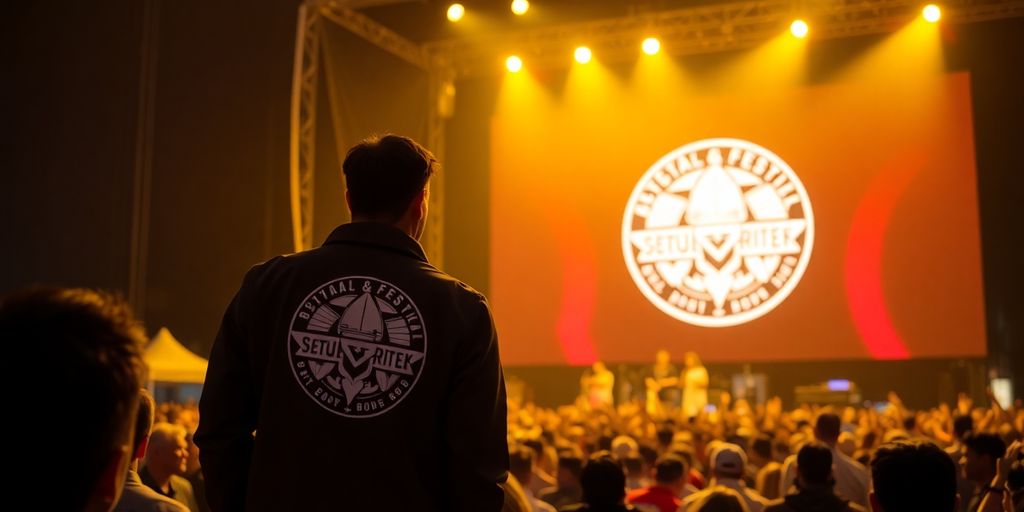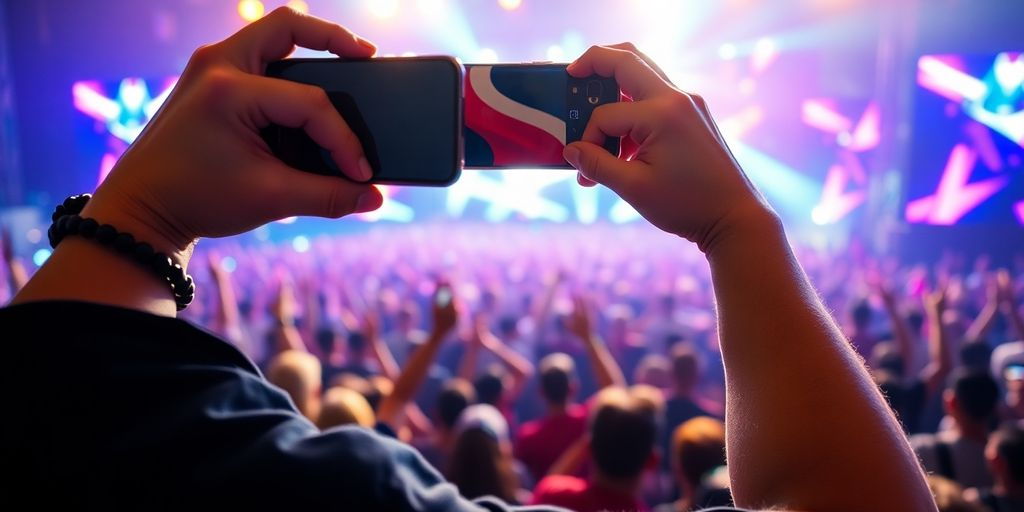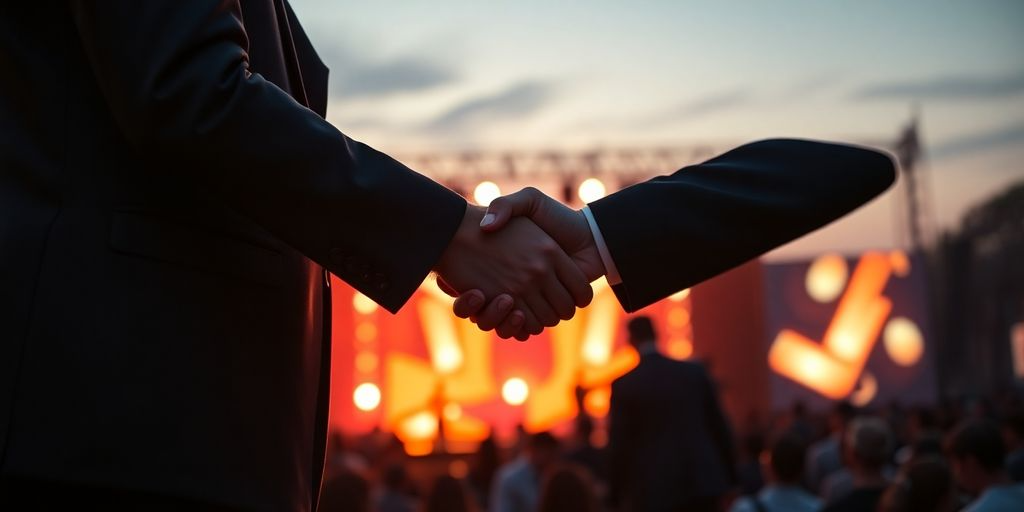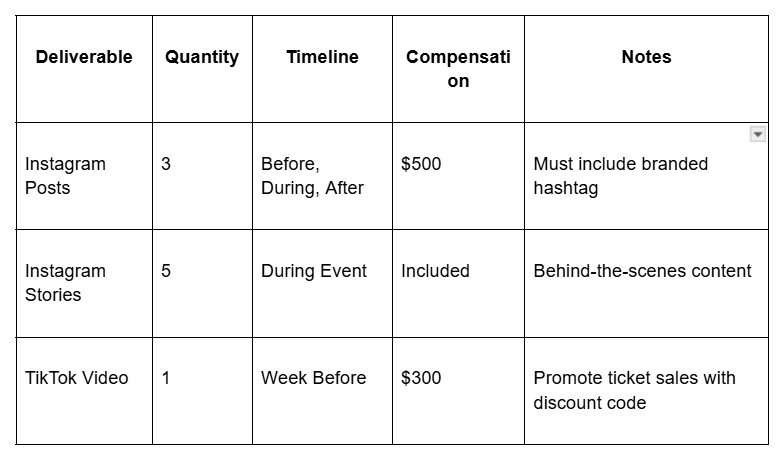Register as an organizer
Click the button below and finish your organizer registration, or fill out the form and we will be in touch to assist you.

Getting the word out about a music event can be tough. You can put up flyers and post on your own social media, but sometimes it feels like you're just shouting into the void. That's where working with people who already have a local following comes in. This whole idea of local influencer co-branding is about teaming up with creators in your city to get your event in front of the right people. It's not just about paying for a post; it's about building a real connection that gets their audience excited to come.

Finding the right local influencers can really make or break your music event. It's not just about picking someone with a lot of followers; it's about finding someone who genuinely connects with your target audience and believes in what you're doing. Think of it as finding a brand ambassador who actually lives the lifestyle your event promotes.
It's super important to make sure the influencer's vibe matches your event's brand. If you're throwing a chill indie music festival, you probably don't want an influencer known for promoting heavy metal concerts. Look for influencers whose personal brand and content style naturally align with the music genre and overall atmosphere of your event. This makes the partnership feel more authentic and less like a forced advertisement. Check their past posts, the brands they've worked with, and the kind of content they usually create. Do they fit the aesthetic?
Don't get too caught up in follower counts. An influencer with 10,000 highly engaged followers is often more effective than someone with 100,000 followers who don't really interact with their content. Look at their engagement rate (likes, comments, shares) relative to their follower count. Are people actually responding to what they post? Do they have a higher audience engagement? Also, check the quality of the comments. Are they genuine interactions, or just generic responses? Tools like social media analytics platforms can help you dig deeper into these metrics.
Authenticity is key. People can spot a fake endorsement a mile away. You want influencers who genuinely love the music and the local scene. Here's how to check:
Partnering with an influencer who has a strong, trusting relationship with their audience is way more valuable than working with someone who just has a large following. It's about finding someone who can genuinely influence their audience's decisions, not just broadcast to them.
It's also a good idea to do a quick Google search to see if they've been involved in any controversies or scandals. You want to make sure their reputation is squeaky clean before you associate them with your event.
It's time to get real. You've found your influencers, now what? The key is making content that doesn't feel forced. People can smell a fake partnership a mile away. Let's make sure your co-branding efforts feel as natural as possible.
Give your audience a sneak peek! Partner with influencers to create content that shows what goes on before the big day. This could be anything from setting up the stage to artist soundchecks. Exclusivity is the name of the game. Think about:
This kind of content makes people feel like they're getting something special, something they wouldn't see anywhere else. It builds anticipation and makes them more likely to buy a ticket. Effective concert public relations builds excitement for live music events.
Get your audience involved! The best way to do this is through user-generated content (UGC). Create a unique, branded hashtag for your event and encourage attendees to use it when they post photos and videos. Run contests where people can win prizes for the best content. This does a few things:
User-generated content is gold. People trust it more than traditional advertising. It's authentic, it's real, and it's coming straight from your target audience.
Don't just promote your event; tell a story. What makes your event special? What's the vibe? What's the connection to the local music scene? Work with influencers to craft a narrative that speaks to the heart of your target audience. This could involve:
Make sure the narrative feels genuine and reflects the values of your brand and the influencers you're working with. If you do that, you'll create content that truly connects with people.
It's not enough to just create content; you need to make sure it actually reaches people! This means understanding the nuances of each social media platform and tailoring your co-branded content accordingly. Think of it as speaking different languages – what works on TikTok might completely flop on Facebook. The key is strategic distribution and engagement.
Each platform has its own unique audience and content style. For Instagram, focus on high-quality visuals and engaging stories. Think behind-the-scenes glimpses of the event setup or short video snippets of the artists. TikTok is all about short, catchy videos that can go viral. Use trending sounds and participate in relevant challenges to increase visibility. Facebook is great for building community and sharing more detailed information about the event. Create a Facebook Event page and use targeted ads to reach potential attendees. Remember to promote an event on social media with eye catching graphics.
Here's a quick breakdown:
Live sessions are a fantastic way to connect with your audience in real-time. Partner with your chosen influencers to host Q&A sessions, behind-the-scenes tours, or even mini-performances. This gives fans a chance to interact directly with the influencers and get excited about the event. Make sure to promote the live sessions in advance and encourage viewers to ask questions. This can significantly boost engagement and create a buzz around your music event.
Organic reach is great, but sometimes you need a little extra push. Targeted ads can help you reach a wider audience and ensure that your influencer-led promotions are seen by the right people. Use platform-specific targeting options to reach users based on their interests, demographics, and behaviors. For example, you could target people who have liked similar music events or who follow artists that are performing at your event. Data reveals ads targeting similar profiles can lead to a 20% increase in attendee registration rates.
Don't just throw money at ads without a plan. Carefully consider your target audience, ad creative, and budget to maximize your return on investment. A well-executed ad campaign can significantly amplify the reach of your influencer co-branding efforts.

It's easy to get excited about influencer co-branding, but let's be real: without a solid agreement, things can go south fast. You need to make sure everyone is on the same page from the start. This isn't just about being nice; it's about protecting your event and making sure you both get what you expect from the deal.
The first step is to spell out exactly what you expect from the influencer. This includes the number of posts, the type of content (videos, stories, etc.), and when everything needs to be published. Don't leave anything up to chance. A vague agreement is a recipe for disaster. Also, be upfront about how much you're paying and when they'll get paid.
Here's a basic example of how you might structure deliverables:

Money isn't everything. Influencers often value experiences and access just as much, if not more. Think about what you can offer that goes beyond a paycheck. Can you give them backstage passes? A meet-and-greet with the headlining artist? Early access to the event? These perks can make your event more attractive and create a stronger relationship.
Don't just think about the influencer and your event. Consider how you can create a network of support with other local businesses. Maybe the influencer can promote a local restaurant that's sponsoring the event, or vice versa. This creates a win-win situation for everyone involved and expands your reach even further.
Think of your influencer partnerships as more than just transactions. They're about building relationships within the local community. The more you can connect the influencer with other businesses and opportunities, the more valuable the partnership becomes for everyone.
Okay, so you've got your local influencers on board, content's flowing, and the event is buzzing. But how do you really know if all that effort is paying off? It's time to put on your data detective hat and start tracking. It's not just about feeling good; it's about seeing tangible results and making smart decisions for future events. Let's get into it.
This is probably the most direct way to see an influencer's impact. Give each influencer a unique discount code to share with their followers. This way, you can directly attribute ticket sales to specific influencers. It's simple, effective, and gives you hard numbers to work with. You can easily see which influencers are driving the most sales and which ones might need a little extra support. Plus, it gives their followers an incentive to buy tickets! It's a win-win. Make sure to promote the discount codes clearly on all platforms.
Beyond ticket sales, social media metrics are your best friend. Keep a close eye on reach (how many people saw the content), impressions (how many times the content was displayed), and engagement rates (likes, comments, shares). Tools like Google Analytics or even the built-in analytics on platforms like Instagram and TikTok can give you a wealth of data. Look for spikes in activity around influencer posts. Are people sharing the content? Are they tagging their friends? This tells you how well the content is resonating with the audience. Don't just look at the numbers in isolation; compare them to your previous campaigns to see if there's a real improvement. It's all about understanding the trend.
Numbers are great, but they don't tell the whole story. You also need to understand how people feel about the event and the influencer collaboration. This is where audience sentiment analysis comes in. Tools can help you track mentions of your event and influencers across social media and analyze the overall tone (positive, negative, neutral). Also, don't underestimate the power of direct feedback. Send out post-event surveys to attendees and ask specific questions about their experience with the influencers. What did they like? What could be improved? This qualitative data is invaluable for refining your strategy and building stronger relationships with both influencers and your audience.
Measuring the impact of influencer co-branding isn't just about vanity metrics. It's about understanding what works, what doesn't, and how to optimize your strategy for future success. By tracking ticket sales, monitoring social media, and analyzing audience sentiment, you can gain valuable insights that will help you make smarter decisions and achieve your event goals.
Okay, so you've got your local influencers on board. Awesome! But how does this co-branding thing actually fit into everything else you're doing to promote your music event? It's not just about slapping a logo on a post and hoping for the best. It's about making sure all the pieces work together.
Think of your influencers as extensions of your marketing team. Their message needs to match the overall vibe and goals of your event. Are you trying to sell a ton of tickets? Create a buzz? Or build a long-term community? Make sure your influencers know what you're aiming for. It's like giving them a script, but letting them improvise a little to keep it real. This is part of an effective event marketing strategy.
Don't let that awesome influencer content just sit on their pages. Repurpose it! Turn their videos into ads, use their photos in your email newsletters, and share their posts on your event's social media. It's all about getting the most mileage out of the content they create. Think of it as recycling, but for marketing. It's also a great way to show your influencers that you value their work.
One-off campaigns are cool, but building lasting relationships with local influencers is where the real magic happens. Think about it, these people are already plugged into your community. If you treat them well, they can become long-term advocates for your event. It's like planting a seed and watching it grow into a beautiful, ticket-selling tree. Plus, they can help you tap into user generated content and shares.
Building these relationships takes time and effort. It's not just about paying them for a post. It's about genuinely connecting with them, understanding their audience, and finding ways to collaborate that benefit everyone involved. Think of it as making friends, but with a business twist.
Here's a simple breakdown of how to make it work:
So, what's the big takeaway here? Teaming up with local influencers for your music event is a pretty solid idea. It's not just about paying someone for a quick post on their feed. It's more about building a real connection. When you work with someone who's actually part of the local scene, their followers notice. It feels a lot more real than some random ad they scroll past. This kind of co-branding helps you tap into a crowd that's already interested in what's happening in town. You get your event in front of the right people, and it builds a bit of a community feel before the doors even open. In the end, it’s a good way to get more people excited and through the door.
Start by looking for local creators whose personal style matches your event's atmosphere. If you're putting on a relaxed indie music night, a high energy dance influencer might not be the best choice. Don't just focus on how many followers they have. It's more important to see if their audience is actively commenting and sharing their posts, which shows they have a genuine connection.
The most effective content comes from working together. You can create exciting behind-the-scenes videos to give people a sneak peek before the event. Another great idea is to run a contest with a special hashtag, encouraging followers to post their own content for a chance to win free tickets. This gets people involved and builds a buzz.
Not always. While some influencers do expect money, many are happy with other arrangements. You can offer them valuable perks like VIP passes, exclusive access to meet the artists, or free merchandise. Think about what unique experiences you can provide that they couldn't get anywhere else. These special treats can be just as valuable as cash.
A simple way to see the results is by giving your influencer a unique discount code for tickets. This lets you track exactly how many sales they brought in. You should also monitor their social media posts to see how many people they reached and how many likes and comments they received. This will give you a clear picture of the impact.
You can definitely use the content they create in other places! The photos and videos from your influencer partnership are perfect for your own social media ads, email newsletters, and even on your website. Using their content makes your overall marketing feel more authentic and connected, strengthening your message across all channels.
Building a long-term friendship with an influencer is often much better than a one-time project. When their followers see them consistently supporting your events, it builds trust and feels more genuine. This helps create a loyal community around your brand that will be excited for your events year after year.
More blogs
Click the button below and finish your organizer registration, or fill out the form and we will be in touch to assist you.